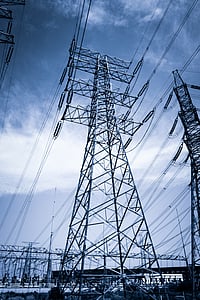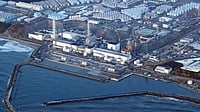The increase in data consumption, computing capacity, digitalisation, cloud migration and, above all, the massive scale of artificial intelligence (AI) adoption has propelled the growth of data centres worldwide. The surge in new capacity is not only in developed countries, emerging market economies are also a part of this data centre expansion. India, the software, information technology (IT) and analytical services hub, will add many data centres in the coming years.
Data Centres and Climate Change Intertwined
Data centres consume vast amounts of electricity and water, directly and indirectly. The International Energy Agency (IEA) estimates they consumed about 1-1.5 per cent of the world's electricity (300 terawatt hours/TWh) in 2022, and this can be expected to grow to 8 per cent by 2030. Most of the incremental electricity demand is for AI usage.
India’s data centre installed capacity is expected to grow from 960 megawatts (MW) to up to 9.2 gigawatts (GW) by 2030, as per Nomura's estimates. Going by this, the domestic installed capacity is likely to expand ninefold. Currently, data centres account for less than 1 per cent of India’s total electricity consumption. However, this could increase to 3 per cent by 2030.
Moreover, data centres also have a high water requirement primarily for equipment cooling purposes. In the US, a mid-sized data centre typically consumes around 300,000 gallons (1.14 megalitres) of water daily, equivalent to the water used by 100,000 households.
India’s efforts to become a major global data centre is thus expected to drive energy and water demand exponentially, even as its supply-side ecosystem continues to be constrained. The surge in energy demand, mostly met by fossil fuels, could complicate India’s decarbonisation plans for its economy. Moreover, the rising water demand in several urban and suburban areas once the new data centres are installed is expected to test cities that are already experiencing water stress. This could also have a cascading effect on other sectors, such as agriculture and industry, which would have to compete with these newly-installed data centres to meet the required levels of power and water demand.
Data Centres: Location Matters
AI data centre complexes are expected to vie for space around India’s global capability centres (GCC) – Bengaluru, Mumbai, Chennai, Hyderabad, Pune and the National Capital Region (NCR). The IEA states that clustering data centres together benefits centre operators, optic-fibre network providers and consumers, especially those who need near real-time and quick access to data such as financial services and healthcare applications. However, this has substantial implications for local management of power and water.
Therefore, any decision regarding the location of data centres should be made taking into account the country’s rapid, equitable and sustainable development plan. Choosing the right location for data centres is key to realising India's true potential in computing capability while balancing its environmental commitments.
Coast Is Clear To Power the Boom
India’s coastal regions offer many advantages as a strategic location for new data centres. Proximity to near-shore wind and solar generation and energy storage facilities can significantly reduce transmission infrastructure costs, energy losses and right-of-way land acquisition issues for data centres. This also fits perfectly with the country’s new energy expansion roadmap. The relatively moderate temperature ranges in India’s coastal regions could also reduce data centres’ energy and water demands.
Moreover, as renewable energy projects are modular, they can be rapidly scaled up to match the rate of data centre growth. Energy flows can be ring-fenced through the spatial co-location of data centres and associated power infrastructure, avoiding additional stress on local distribution grids.
For such an energy mix to thrive in India, coastal regions offer a distinct value proposition for co-locating data centres and allied facilities. As for the cooling requirements for data centres, coastal areas offer an abundant resource in the form of seawater, which can be used without desalination. Microsoft has indeed gone a step further, successfully testing an underwater data centre off the coast of Orkney in Scotland. Apart from the National Capital Region, all of India’s emerging data centre clusters are located roughly 300 km off the coast.
What Is the Policy Choice?
To reduce carbon emissions and water usage, large technology companies have heavily invested in renewable energy projects, carbon trading mechanisms and energy and water efficiency measures, especially in developed countries. Some tech giants are also exploring small modular nuclear reactors (SMR) to complement renewable energy.
However, initiatives by individual companies alone will not be enough to achieve India’s desired decarbonisation goals. In the initial stages, the public sector can partner with private players to set up turnkey data centre projects in coastal areas to complement the development of SMR and offshore and floating wind/solar projects.
A smart combination of incentives and penalties can then nudge companies to prioritise coastal areas while crafting the future of India’s data centres, such as increasing water costs for data-centre applications in water-scarce regions and incentivising solar, wind and hybrid projects.
A revamped framework for granting environmental clearances in India’s eco-sensitive coastal zones will expedite this movement. To foster partnerships across startups, academia and industry, pilot initiatives under the Make in India scheme can promote a cross-pollination of ideas that can weave together two major global megatrends of our contemporary times: data centres and climate action.
Focusing on ways to integrate India’s IT prowess with its clean energy ambitions and water conservation efforts, the country must build an enabling ecosystem that promotes green data centres that create high-paying jobs for Indians.
(Labanya Prakash Jena is a sustainable finance specialist at IEEFA and Prasad Ashok Thakur is an alumnus of IIT Bombay and IIM Ahmedabad. Views expressed are personal.)






























